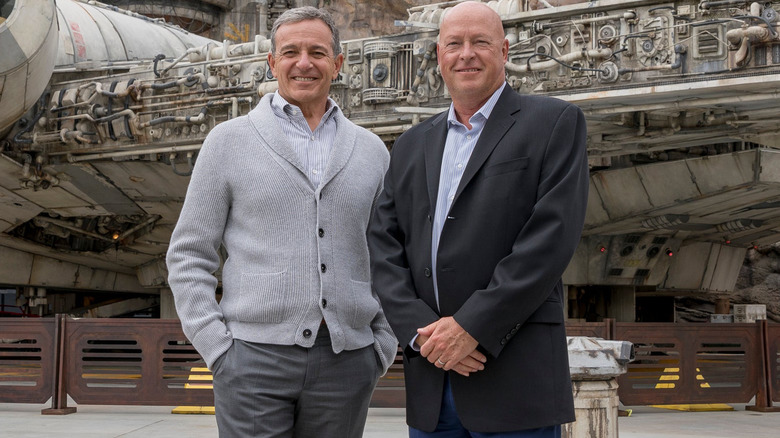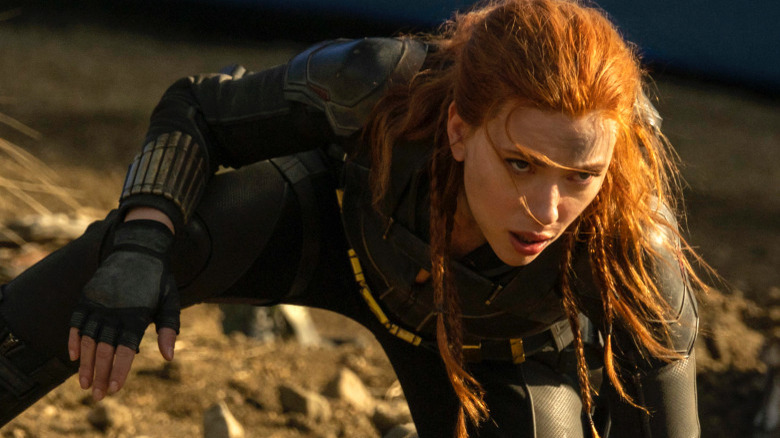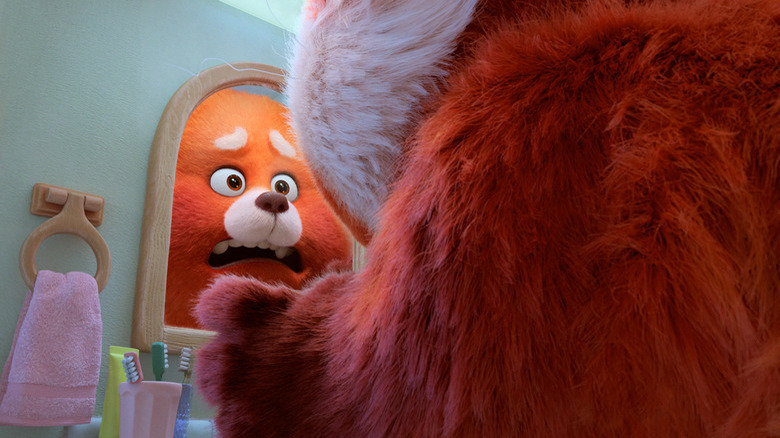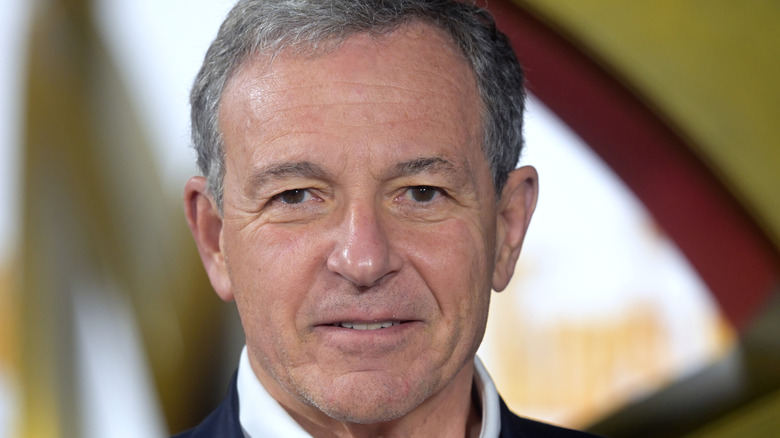Battle Of The Bobs: What Disney's Leadership Feud Means For Moviegoers
Bob Chapek is nearly two years into his run as the Walt Disney Company's CEO, and so far it's been, well, not great Bob. (I know, I'm sorry, but I wouldn't be doing my duty as a /Film writer if I wrote this article without alluding to that "Mad Men" meme at least once.) Under Chapek's watch, the House of Mouse has gotten heat for scrapping the theatrical release of several Pixar animated movies in favor of sending them directly to Disney+, faced a lawsuit from Scarlett Johansson after allegedly breaching her "Black Widow" contract with the film's hybrid rollout, and replaced the popular FastPass ticketing system at its theme parks with a more costly service known as Disney Genie+. Bear in mind, this was all before Disney came under fire for sponsoring the politicians behind Florida's HB 1557, AKA the "Don't Say Gay" bill, and Chapek failed to publicly denounce the bill until after it had already passed both the Florida House of Representatives and Senate.
Chapek took over as Disney's CEO from Bob Iger, who announced his retirement in late February 2020 after a 15-year run that saw the company tighten its iron-clad grip on the industry by acquiring Pixar, Marvel Studios, Lucasfilm, and Fox's movie and TV assets before launching its Disney+ streaming service. "I can't think of a better person to succeed me in this role," said Iger of Chapek at Disney's annual shareholder meeting on March 11, 2020. Chapek returned the compliment at the event, praising Iger for leading the Mouse House to "amazing new heights" before adding, "I've learned an enormous amount from that experience."
Since then, however, the two Bobs have reportedly had a falling-out over Chapek's decision-making as the head of Disney, as detailed in a newly-published article from CNBC. But what led to this leadership feud, and why should your average Disney fan even care?
A clash of King-Bobs
It's worth noting that Chapek's appointment as Disney's CEO was met with unhappy social media reactions from those familiar with the decisions he made during his tenure as the head of Disney Parks, Experiences, and Products. Under his watch, Disney's theme parks saw an uptick in hard-ticket events and reduced operating hours that, combined with ticket price increases, served to make the park-going experience even more expensive. This has only continued since he became CEO, too, as evidenced by the ending of the old FastPass system in favor of the poorly-received Disney Genie+ service.
Chapek didn't exactly prove his doubters wrong with the way he handled the transition of power between him and Iger, either. As you might recall, right after the shareholder meeting in which Iger formally passed the torch as CEO to Chapek, Disney began closing its theme parks as part of the COVID-19 lockdowns. A month later, Iger told The New York Times he would stick around at Disney to help Chapek manage things for the time being, deeming it necessary for "a crisis of this magnitude." However, according to "three people familiar with the matter" who spoke to CNBC, Chapek was "furious" when he learned about Iger's comments and felt the latter was undermining his authority as CEO, having not reached out to Iger directly to ask for his assistance.
Hoping to avoid a power struggle between Iger and Chapek, the Disney board accelerated the timetable for making Chapek its new head, which it did three days after Iger's comments were published. If anything, though, that only made things worse. Rather than being eased into his role as CEO under Iger's guidance, Chapek was now free to begin making decisions on his own without Iger's input. As a result, Chapek and Iger would often send conflicting internal messages to Disney's employees about the company's business strategy over the months that came after, which only added to all the stress and confusion caused by the pandemic. This also put Chapek at odds with Disney executives who were loyal to Iger after decades of working together — meaning, Chapek wasn't able to learn from their experiences when it comes to interacting with the artists who actually create Disney's movies and TV shows, or how to avoid making them feel like their work is being under-valued.
No one Bob should have all that power
As Disney's CEO, Chapek is known for only confiding in a handful of people — as CNBC describes them, his "longtime right-hand man Kareem Daniel, chief of staff Arthur Bochner, and, to some degree, Chief Financial Officer Christine McCarthy" — when it comes to his decisions. This led to even more internal conflict at Disney when Chapek announced the company would be reorganizing to focus primarily on streaming in October 2020, with Daniel being made the head of the new Media and Entertainment Distribution group, AKA the DMED. As Chapek put it, the DMED is now "responsible for all monetization of content — both distribution and ad sales — and will oversee operations of the company's streaming services. It will also have sole P&L accountability for Disney's media and entertainment businesses."
In other words? Daniel and the DMED now have direct control over the budgets for Disney's various divisions, as well as which projects do and don't receive a green light. This not only puts more power in Chapek and Daniel's hands, it also makes it easier for them to approve polarizing decisions that would've taken much longer in the past (like sending "Turning Red" straight to Disney+) since other executives no longer have the ability to control their divisions the way they once did. As you would expect, this has already caused top-ranking executives to leave Disney in search of better deals elsewhere. In the case of former Hulu head honcho Kelly Campbell, her decision to join Peacock in the fall of 2021 was "at least partially motivated by her desire to have more control over a business than what Disney allowed her," per one of CNBC's many sources.
The problem isn't, per se, Daniel, who's described as "smart, hard-working, and gregarious" by five of his former or current co-workers. He is also the first Black senior executive ever to report directly to the Disney CEO in the company's history, which (to quote CNBC) "carries weight with certain employees, who respect the symbolism of a minority leader in such a high-profile role." But at the same time, one of Daniel's former co-workers argued that his job is simply too big for any single person to handle:
"He arguably has the most important job at Walt Disney, outside of CEO, and he has almost no experience running any of these businesses that were previously run by people that had decades of experience."
Meet the new Bob, same as the old Bob?
Because of all this, Iger and Chapek had "little interaction" and seemed to go out of their way to avoid one another at the going-away party that Iger held upon stepping down as one of Disney's executive chairmen at the end of 2021. ("It was extremely awkward," said a guest who preferred to keep their name off the record. "The tension was palpable.") Iger has also been pretty outspoken in voicing his disagreement with Chapek's data-driven approach to deciding what does and doesn't get made at Disney now. As he told The New York Times in February 2022:
"If we had tried to mine all the data that we had at the time to determine whether we should make a superhero movie that was essentially about an Afrofuturistic world with a Black cast, the data probably would have said, don't do that, and 'Black Panther' never would have been made."
Between statements like this and Iger speaking out against the "Don't Say Gay" bill long before Chapek did, it's only natural to feel like the new Disney CEO named Bob is much worse than the old one — and in many ways he is, undoing steps Iger took (like having the power to greenlight projects rest with the heads of Disney's streaming services) to avoid creating the mess the company now finds itself in. But at the same time, several Disney executives told CNBC that Chapek's top priority — "setting up Disney for a digital world where streaming dominates and legacy distribution models fade away" — is ultimately the same as Iger's was. Iger was also the one who spear-headed Disney's purchase of Fox's media assets, a move that has already had terrible ripple effects on the industry. And let's not pretend that Iger is blameless when it comes to Disney censoring "overly gay affection" in Pixar's movies, either, or the studio's poor track record of on-screen queer representation in general.
Getting to the point: As moviegoers, TV viewers, and the people who willingly pay to visit Disney's theme parks, the onus is on us to speak out when the company does wrong and hold it accountable for its current CEO's actions (or, in the case of the "Don't Say Gay" bill, lack of action), as much as we can reasonably hope to impact a corporation as monstrously giant as the Mouse House. We should likewise continue to call upon Chapek to actually do better in ways that matter or step down, rather than counting on his future successor to fix things or being nostalgic for a time when Disney CEOs were not quite as openly power-hungry (and certainly better at PR). At the end of the day, they're all still named Bob anyway.



